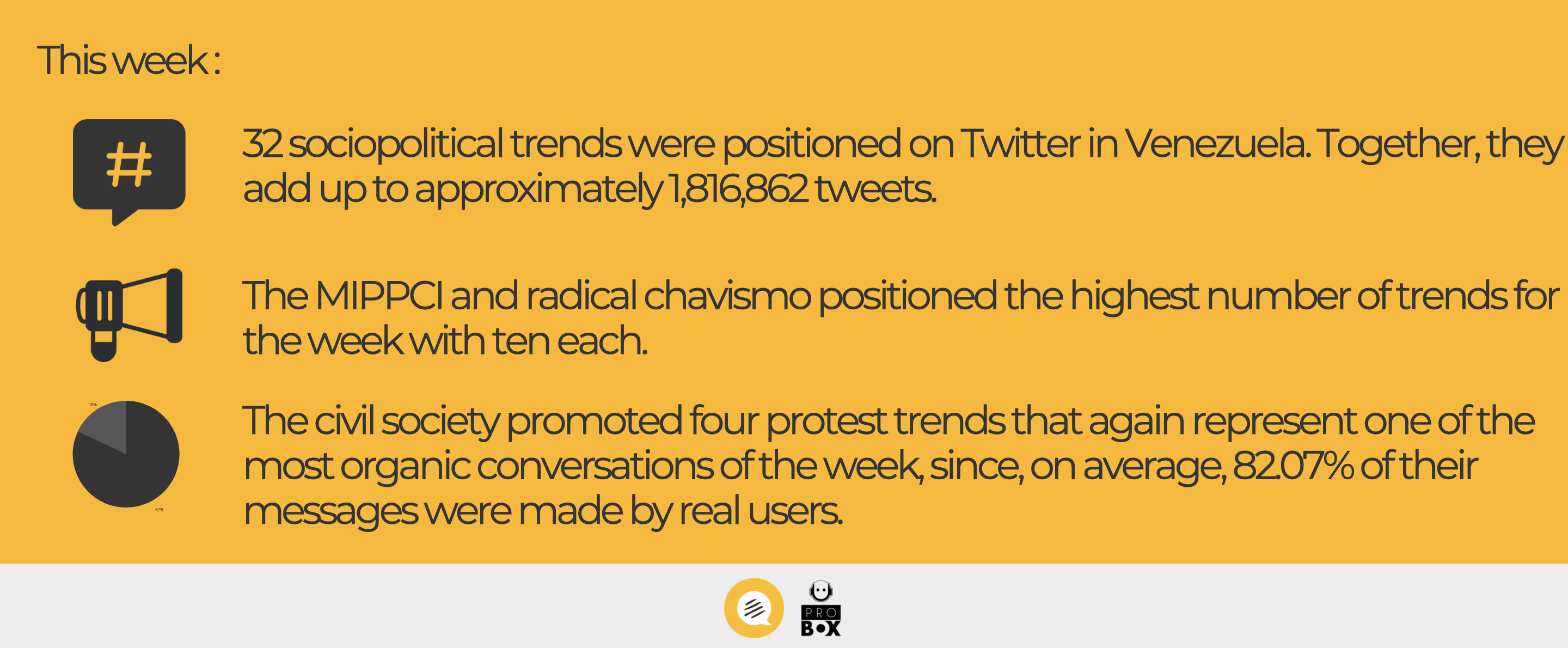Chavismo Trolls Its Way Around the Crimes Against Humanity Investigation
This week, Probox Politwitter highlighted the elections and the misinformation regarding Alex Saab. But the most relevant topic was the ICC Chief Prosecutor’s visit


The visit of the ICC Chief Prosecutor Karim Khan to Venezuela and his decision to open an investigation on crimes against humanity in the country wasn’t only widely covered through the media, the civil society also organized street and digital protests that positioned trends demanding justice. Meanwhile, the government was in charge of positioning trends on how justice is already guaranteed in Venezuela.
Khan arrived in Venezuela to make the first contacts with the State in case he chose to advance the investigation. His office had already gathered information coming from human rights NGOs, based on testimonies from victims and experts, and Kham announced, sitting right next to Maduro, that he decided to open an investigation for crimes against humanity in Venezuela. The announcement was made from Miraflores Palace, during the signing of a memorandum of understanding with Maduro, in which he agrees to cooperate with the process.
📢 #ICC Prosecutor #KarimAAKhanQC opens an investigation into the Situation in #Venezuela and concludes Memorandum of Understanding 🤝 with the Government ⤵ #JusticeMattershttps://t.co/aTcIQCW9V6
— Int'l Criminal Court (@IntlCrimCourt) November 5, 2021
Social media has been crucial in the discussions about justice in Venezuela. Human Rights activists highlighted how Attorney General Tarek William Saab only investigates cases after they have been trending on social media. “How does the justice system work in Venezuela? You have to make your case go viral on Twitter first,” says feminist activist Melanie Agrinzones. This Twitter thread also accurately explains why the Venezuelan justice system isn’t designed for justice:
Las medidas de aprehensión e imputación contra Petrocelli solo son injustas por una razón.
Porque nuestro sistema de justicia no está diseñado para hacer justicia.
Abro hilo 🧵
— Daniela Dávila Torres (@IdeasdeDaniela) September 2, 2021
Needless to say, people were very vocal about Khan’s decision on social media.
Who talked about it on Twitter?
- The Ministry of information promoted four hashtags to control the narrative through two fundamental messages: the Venezuelan justice system works perfectly fine, and Venezuela cooperates because institutions have nothing to hide.
- The entities of Maduro’s regime used these hashtags:
- #CooperaciónCPI: 110,000 tweets with 60.23% of inorganic interaction.
- #VenezuelaGarantizaLaJusticia: 47,459 tweets with 74.57% of inorganic activity, especially during Khan’s announcement.
- #DocumentoHistórico: 124,000 tweets with 67,06% of inorganic activity. This was also a trending topic in Nicaragua.
- #VenezuelaJusticiaSoberana: 148,000 tweets with 68,92% of inorganic activity.
- What were the most repeated words in the messages with these hashtags? Happiness, peace, security, protection.
- Radical chavismo promoted one hashtag:
- Diosdado Cabello promoted #ChavismoEsJusticiaYPaz (18,000 tweets with a 16,03% of inorganic activity) on his TV show Con el Mazo Dando. He manages to link this hashtag to a message promoting the November election.
- The civil society promoted two hashtags:
- #VenezuelaExigeJusticia: 1,858 tweets, with 97.39% of organic interaction and led by NGOs Provea, Amnistía Internacional, Codhez, Acceso a la Justicia and CEPAZ.
- #SOSVenezuelaCPI: 4,467 tweets with 74.32% of organic interaction and led by Médicos Unidos de Venezuela denouncing the government’s lack of support for sanitary workers during the COVID-19 pandemic, which has resulted in the death of 779 health workers.
- What were the most repeated words in the messages with these hashtags? Torture, death, crime, impunity, justice, responsible, extrajudicial executions, untouchables.
What does this mean?
Chavismo sought to dominate the conversation about the ICC’s decision, tried to position the narrative that there’s no need for an investigation, and simulated support for that narrative with thousands of messages. The regime also needs to stimulate the perception that Khan is an ally, not an enemy. Meanwhile, civil society and citizens told another story, exposed the cases of human rights violations, and demanded justice beyond the crimes that occurred in the 2014-2019 protests. “This is another episode of ‘chavismo’s classic fantasies’: they simulate control, create inorganic support, misinform on the case, create interpretations of why they are being attacked and silence the people who are denouncing violence from the government,” says Probox.
Caracas Chronicles is 100% reader-supported.
We’ve been able to hang on for 22 years in one of the craziest media landscapes in the world. We’ve seen different media outlets in Venezuela (and abroad) closing shop, something we’re looking to avoid at all costs. Your collaboration goes a long way in helping us weather the storm.
Donate





